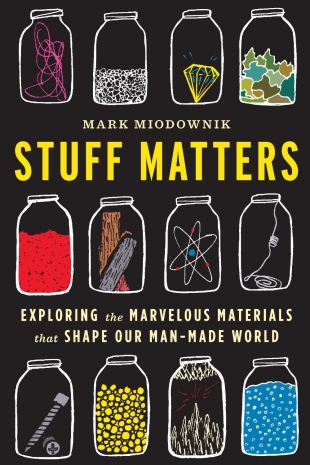Mark Miodownik is a professor of materials and society at University College London. He is director of the Institute of Making, which is home to a materials library containing some of the most wondrous matter on earth. We could tell from the outset that this would be a book we would treasure. There is a picture of the author seated at a table on the roof of his flat (something we also do) and behind him are concrete structures, glass, textile, and metal. Miodownik states: "The material world is not just a display of technology and culture, it is part of us. We invented it, we made it, and in turn it makes us who we are."
In this spiffy volume, the author tells the story of ten materials which provide us with much of the stuff that surrounds us. Midownik shares his enthusiasm for the practical, emotional, and sensual aspect of materials such as steel, concrete, ceramics, polymers, glass, and more. Far and away the most relevant chapter for us is the one on paper. In a two-page description, Midownik lists all the different places paper is used from the napkins on our table to the wrapping paper for gifts to the paperwork at the office. This 2000-year-old technology is slowly departing from our daily lives as the digital world makes printed newspapers obsolete along with writing letters on sheets of paper.
As we were reading this celebration of the stuff we take for granted, our minds clicked on the poet Francis Ponge who was called "the poet of things" because of the attention and creativity he lavished on simple objects like a plant, a stone, a shell, or a piece of soap. As Richard Stamelman wrote about him in Books Abroad: "For Ponge, all objects yearn to express themselves and they mutely await the coming of the word so that they may reveal the hidden depths of their being." Midownik seems to share that sentiment. Both the poet and the professor deserve our praise for opening our eyes to the deeper value of objects we often ignore.
